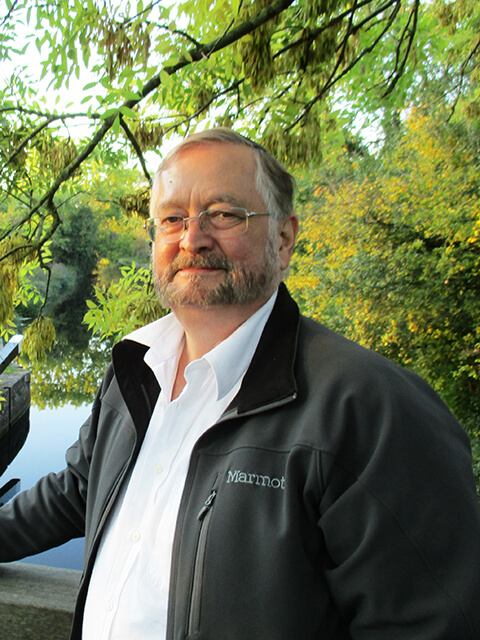Background
Professor Dickerson is Chair of Systems Engineering at Loughborough University and came to the UK in 2007 to serve as the Royal Academy of Engineering Chair. Previously he has been Director of Architecture for the US Navy, Aegis Systems Engineer for Ballistic Missile Defense, and Technical Fellow for BAE Systems.
With over 25 years experience in industry and government, he brings unique expertise in the development and testing of aerospace systems and complex systems of systems. This includes positions at Northrop Advanced Systems as Survivability Analyst for advanced air vehicle design and later at Lockheed Skunkworks as Research Engineer for developing advanced avionics systems.
As the in situ civilian Scientific Analyst assigned to the US Navy Operational Test and Evaluation Squadron for fighter aircraft at Point Mugu, California, he was the lead analyst for the F/A-18 operational testing and acceptance. He also has extensive technical flight test experience in radar and missile systems in operational environments.
As a member of the Research Staff at MIT Lincoln Laboratory, he was, for example, Fight Test Designer, Director and Analyst for the first ever dynamic and complete radar measurement of near specular enhancement over rough surfaces. His novel use of electromagnetic theory and measurements led to a correction in the near specular region for the Beckman-Spizzichino theory of rough surface scattering of electromagnetic waves.
Building on this expertise, most recently, he has been working with an Innovate UK collaborative team on the commercialisation and testing of wireless charging systems for electric automotive vehicles.
The electric vehicle work includes application of advances made in a six year collaborative research programme with Jaguar Land Rover and EPSRC, the objective of which was to use innovative modelling and simulation for rigorous design and analysis to rapidly integrate substantially increased levels of functionality into the vehicle as a complex system. This work highlighted the importance of advanced systems engineering concepts in a novel way that expands systems engineering from its origin in defence into the commercial world.
Since coming to the UK in 2007, Professor Dickerson’s work on a scientific basis for the architecting and engineering of systems has produced new theories and methods. These have been developed under government and industry sponsorship and independent research. They have been applied across a variety of engineering disciplines. Principal Investigator and Co-Investigator roles are listed in his grants.
Qualifications and awards
- Doctor of Philosophy, Purdue University, West Lafayette, Indiana, USA: 1980
- Research: Calculation of the semi-classical approximation in quantum electrodynamics
- Master of Arts, the University of Texas, Arlington, USA: 1972
- Research: Characterisation of Boolean Spaces by Rings of Continuous Functions
Since coming to Loughborough University, the stated objective for my research has been and still is to establish a scientific and mathematical basis for the architecting and engineering of systems together with practical methods that have utility to industry.
My research is organised around three interrelated threads:
- The mathematical foundations of Model-Based Systems Engineering (MBSE)
- High impact applications to important systems such as electric vehicles
- Commercialisation and development of the requisite methods and standards for tools to realise a next generation of MBSE
My collaboration with a variety of engineering disciplines and organisations has delivered:
- A mathematical theory of architecture definition as a technical process and model theoretic constraint driven design methods suitable for engineering complex systems
- An international standard for commercial systems engineering tools to enable constraint driven design
- Measurements and models of electromagnetic field emissions from integrated wireless power charging systems that are suitable for developers to use for design and safety analysis
The commercialisation of standards for tools and associated methods is being accomplished through collaboration with major aerospace and automotive companies, software developers, and the Object Management Group.
Grants and contracts
Since the completion of my term as Royal Academy Chair of Systems Engineering in 2012, the following grants have been key to my current research:
- 2020-2022 Innovate UK/ Office for Zero Emissions, AMiCC Project for Electric Vehicle Wireless Charging: PI for System Design Optimization and Pathway to Standardisation
- 2013-2019 EPSRC/ Jaguar Land Rover, Programme for Simulation Innovation:
PI for Theme 1 – Analysis of the Vehicle as a Complex System
Co-I for Theme 8 – Optimisation for Robust System Design
In my teaching duties, I deliver research informed postgraduate modules for a core curriculum on Model-Based Systems Engineering. Tutorials and case studies on radar systems, air traffic control, automotive motorway management systems of systems, and electric vehicles give students a variety of practical applications to learn from.
Current teaching responsibilities
- WSP072/WSP772/WSD572 Systems Architecture
- WSP066/WSP766/WSD566 Systems Design
- WSP067/WSP767/WSD567 Validation & Verification
Current administrative responsibilities
- Tutor for Systems Engineering Apprenticeship Students
- Supervisor for Systems Engineering MSc Dissertations
- Supervisor for PhD and EngDoc Students
